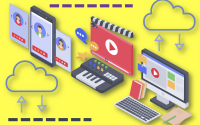
The higher degree by research student as ‘master’: Utilising a design thinking approach to improve learner experience in higher degree research supervision
This article presents a work-based learning and research approach to professional postgraduate education specifically in the case of Higher Degree by Research (HDR) programs. It highlights a prototype of the Cohort-based Advisory Team (CAT) model as a useful strategy. The authors propose that a design thinking approach that empathises with the student experience as the […]
















